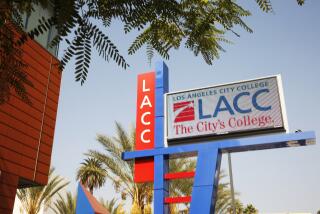Scholarship green
- Share via
My high school summer job paid for my college education. And no, I didn’t manage a hedge fund. I spent my teenage summers caddying at a country club near the west side of Detroit, riding my bike two miles to the golf course each morning at 6 a.m. to lug a 50-pound bag across soaked fairways.
It was a good job for a 15-year-old -- despite the mosquitoes and humidity. On a good day, I could have $50 in my pocket by 11:30 a.m. But it wasn’t the wages that allowed me to attend the University of Michigan for four years without accruing significant debt. My good fortune came from the generosity of the golfers whose bags I carried and their fellow country club members.
I went to college on a Chick Evans Caddie Scholarship, provided by a not-for-profit program run through the Western Golf Assn. and funded primarily through small donations from country club members.
The program was started by Charles “Chick” Evans, an amateur golfer who, instead of turning pro, donated his earnings to two young men at Northwestern University in 1930. The program grew and currently boasts almost 9,000 alumni from 19 universities. This fall, the Evans scholarship will pay full tuition for 845 young men and women who have in common strong academic records, financial need and employment as caddies. It’s a model worth replicating.
For many middle-class and blue-collar students, attending college is a daunting goal. Kids from families not wealthy enough to simply write a check for college but not poor enough to qualify for government aid don’t have many options other than taking on debt.
And in these days of increasingly tight education budgets, the squeeze on the middle class is likely to get tighter. The rich will still be able to afford to send their kids to whatever school they please, and the very poor will get assistance from the government and the colleges they attend -- as they should. But how will the middle class afford the education needed to get a 21st century job?
Student loans are an important fallback, but having thousands of newly minted workers paying back loans instead of buying houses and consumer goods doesn’t do much to strengthen the economy.
That’s where private nonprofit scholarship models, like the Evans scholarship, could play a bigger role. Although many organizations and interest groups offer scholarships, their endowments are often small and too reliant on large donations from rich benefactors. The beauty of the Evans scholarship is that it draws small amounts of money (mostly under $200) from a huge base. More than 140,000 country club members, most of them in the Midwest, give. It’s not much of a burden, and it’s strongly expected -- some are even peer-pressured into donating.
Large programs like the Evans scholarship have proved they can build a sustainable fund without huge donations. And those who have benefited often become benefactors themselves: In 2008, $4 million of the Evans scholarship fund’s annual budget of about $11 million came from alumni.
Consider the possibilities. The California Teachers Assn. provides some scholarships today. But what if each of its 340,000 members kicked in just $10 a year? The group could provide more than 200 $15,000 scholarships each year to future teachers. If even half the members of the California Bar Assn. gave $200 a year, the group could fund nearly 1,500 $15,000 scholarships for law students. Journalists could fund the families of those who deliver newspapers. Audubon Society members could fund young bird watchers, and the National Rifle Assn., young hunters.
And what if the Catholic Church, one Sunday a year, asked every congregant to put an extra couple of bucks in the collection plate to fund college for altar boys and girls?
I can tell you that those of us whose lives were altered by having the doors to unaffordable universities opened are forever grateful. But more than a few thousand caddies deserve that chance.
--
Email: kevin.patra@latimes.com
More to Read
Go beyond the scoreboard
Get the latest on L.A.'s teams in the daily Sports Report newsletter.
You may occasionally receive promotional content from the Los Angeles Times.










